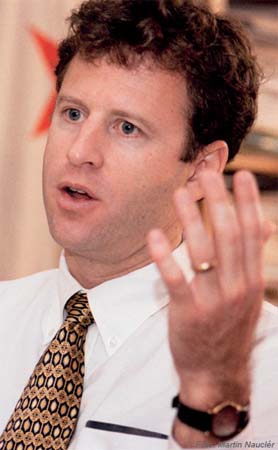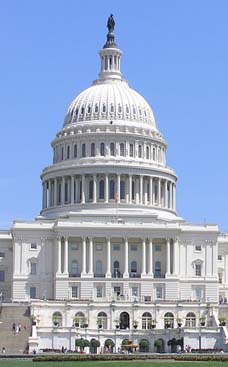
It has introduced an idea generally lacking in the U.S. debate so far -- that our commitment to remain supportive of the Iraqi government should depend in part on how hard the Iraqis themselves work to create the political basis for success. If Iraqis themselves fail to reach consensus in their country, no amount of consensus in our own country, and no amount of American willingness to stay the course, can compensate. Michael O'Hanlon, a Senior Fellow at the Brookings Institute and a Visiting Lecturer at Princeton University, served as a Peace Corps Volunteer in Congo Kinshasa.
Michael O'Hanlon writes: The Iraq Study Group has performed a valuable service
Towards conditional commitment
By Michael O'Hanlon
December 8, 2006
Although its message was somewhat obscured by unclear language in the report and a confusing use of selective leaks in the days before its release, the Iraq Study Group has performed a valuable service.
Most of all, it has introduced an idea generally lacking in the U.S. debate so far -- that our commitment to remain supportive of the Iraqi government should depend in part on how hard the Iraqis themselves work to create the political basis for success. If Iraqis themselves fail to reach consensus in their country, no amount of consensus in our own country, and no amount of American willingness to stay the course, can compensate.
This message is critically important. To date, President Bush has wanted to argue we should remain committed to Iraq regardless of the actions of Iraqi leaders. Our own deployed troop strength should, in his eyes, depend only on how fast the Iraqi security forces are able to take over the job of protecting their own country from us, not on how well Iraqi political figures strive for reasonable compromise with each other. And the most vocal Democrats have wanted to emphasize their desire to withdraw U.S. forces from Iraq unconditionally and hastily out of what they see as a failing mission.
But in fact, America's most logical approach to Iraq is to maximize our leverage in prodding Iraqis to make good decisions. And they must do so in 2007, a make-or-break year. If there is no progress in Iraq in 2007, the incipient civil war in Iraq will likely spin totally out of control. The Democratic Congress may then elect to use its power of the purse to pressure Mr. Bush to draw down American troops quickly. And the forthcoming presidential race will likely become, largely, a competition of ideas about how to extricate ourselves from the quagmire in the Persian Gulf.
Several recommendations from the Baker Hamilton commission merit attention. First, in regard to what may be the report's second most prominent recommendation, the desirability of negotiating with Iran and Syria, this seems a good idea -- as long as our hopes are not too high. If we can send an assistant secretary of state to negotiate with North Korea, we can do something comparable with the autocracies of the Middle East. But it is not clear that Iran and Syria have much influence in Iraq, a country that alas seems fully capable of sustaining a civil war on its own without much outside help. Moreover, Iranian leaders in particular may well have increased their ambitions in Iraq by now. It is quite possible they no longer simply hope to see the United States bogged down for a time, to reduce the chances George Bush will undertake pre-emptive action against them next. Instead, they may be hoping America will suffer a historic defeat that perhaps drives it out of the region and makes the Persian Gulf safe for Iranian hegemony. So diplomacy is worth a try but unlikely to be our silver bullet.
Embedding more American trainers in Iraqi units may help. But it may also get many Americans killed with little reduction of the tendency of Iraqi units to ally with militias and contribute to the sectarian strike more than they contain it. This idea of the study group is probably somewhat more promising than the regional diplomatic proposal but also needs to be undertaken with limited expectations and with caution.
More intriguing perhaps is the report's emphasis on economics. It underscores the need to keep trying in this realm, and to sustain U.S. resources at roughly $5 billion a year. This may seem counterintuitive; we have already essentially devoted a Marshall Plan level of aid to Iraq with little to show for it. But I still believe the study group is right. For one thing, Iraqis need jobs. Giving people hope, a sense of belonging to their country and a bit of money in their pocket, all make sense -- as a security strategy if not an economic development plan. Legions of angry unemployed young Iraqi men provide recruits for the insurgency and militias and we must do what we can to reduce their numbers.
However, returning to what I see as the report's essence, the plan for troop reductions may make good sense. Getting all of our combat troops out of Iraq by 2008 is not the ideal scenario. But to maximize our leverage, we should raise the possibility of doing so, while telling Iraqis we are willing to stay longer should they make key compromises with each other -- on sharing oil revenue, allowing low-level former Ba'athists to compete for their former jobs and rejoin society, reining in militias, settling the issue of the disputed city of Kirkuk in a fair manner that reasonable Sunni Arabs can live with, and so forth.
Iraqis are failing to address these types of issues now. They were supposed to convene a constitutional review committee shortly after forming a new government but eight months later that has not happened. They were supposed to help lower-level former Ba'athists with no blood on their hands rejoin society but that too is not occurring. They also are failing to distribute resources to many key provinces, out of interethnic pique and a sense that Baghdad should run the show throughout Iraq and not defer to local leaders.
Largely because of its poor state of politics, Iraq is headed toward serious civil war. Our only hope for success, or at least mitigating failure, is to shake up the Iraqi political system enough to change this trajectory. We should be prepared to help a lot, for a long time, if Iraqis address the gravity of the situation and make corresponding changes in their policies. But if that fails, we should be prepared to recognize looming defeat and start to go home -- or at least to implement a plan B for a much less ambitious strategy.
Such an approach could consist of a soft partitioning of the country facilitated by voluntary population transfers and programs to give Iraqis new homes and jobs where they resettle (a type of scenario the study group failed to address but that may soon require attention).
Despite the report's limitations, and vagueness in places, the Iraq Study Group has performed a valuable service. Our commitment to Iraq should now be conditional, not a given, and the Iraqis should understand clearly that they are in the driver's seat and only they can determine the fate of their own land.
Michael O'Hanlon, senior fellow at Brookings, is coauthor of "Hard Power: The New Politics of National Security."


















